Related Research Articles

The Byrds was an American rock band formed in Los Angeles, California in 1964 by Roger McGuinn, Gene Clark, David Crosby, Chris Hillman, and Michael Clarke (drums). The Byrds are among the most influential rock acts of the 1960s, with their signature blend of vocal harmonies and McGuinn's electric 12-string Rickenbacker guitar.

"Mr. Tambourine Man" is a song written by Bob Dylan, released as the first track of the acoustic side of his March 1965 album Bringing It All Back Home. The song's popularity led to Dylan recording it live many times, and it has been included in multiple compilation albums. It has been translated into other languages and has been used or referenced in television shows, films, and books.
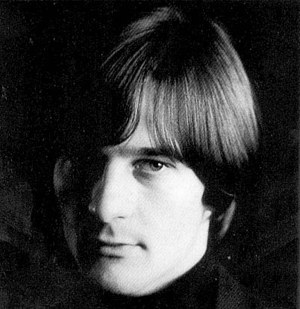
Harold Eugene Clark was an American singer-songwriter and founding member of the folk rock band the Byrds. He was the Byrds' principal songwriter between 1964 and early 1966, writing most of the band's best-known originals from this period, including "I'll Feel a Whole Lot Better", "She Don't Care About Time", "Eight Miles High" and "Set You Free This Time". Although he did not achieve commercial success as a solo artist, Clark was in the vanguard of popular music during much of his career, prefiguring developments in such disparate subgenres as psychedelic rock, baroque pop, newgrass, country rock, and alternative country. He was inducted into the Rock and Roll Hall of Fame in 1991 as a member of the Byrds.

Michael Clarke was an American musician, best known as the drummer for the 1960s rock group the Byrds from 1964 to 1967. He died in 1993, at age 47, from liver failure, a direct result of more than three decades of heavy alcohol consumption.
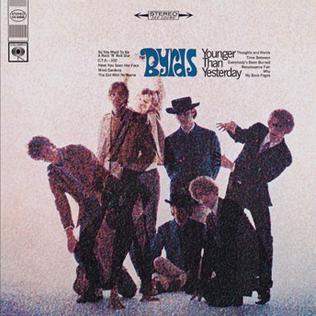
Younger Than Yesterday is the fourth studio album by the American rock band the Byrds and was released on February 6, 1967, on Columbia Records. It saw the band continuing to integrate elements of psychedelia and jazz into their music, a process they had begun on their previous album, Fifth Dimension. In addition, the album captured the band and record producer Gary Usher experimenting with new musical textures, including brass instruments, reverse tape effects and an electronic oscillator.
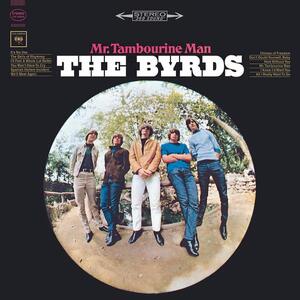
Mr. Tambourine Man is the debut studio album by the American rock band the Byrds and was released on June 21, 1965, by Columbia Records. The album is characterized by the Byrds' signature sound of Jim McGuinn's 12-string Rickenbacker guitar and the band's complex harmony singing. The material on the album mostly consists of cover versions of folk songs, primarily composed by Bob Dylan, and originals written or co-written by singer Gene Clark. Along with the Dylan-penned single of the same name, Mr. Tambourine Man established the band as an internationally successful act and is widely regarded by critics as representing the first effective American challenge to the chart dominance of the Beatles and other British Invasion bands during the mid-1960s.

Turn! Turn! Turn! is the second studio album by American rock band the Byrds, released on December 6, 1965, by Columbia Records. Like its predecessor, Mr. Tambourine Man, the album epitomized the folk rock genre and continued the band's successful mix of vocal harmony and jangly twelve-string Rickenbacker guitar. The album's lead single and title track, "Turn! Turn! Turn!", which was adapted by Pete Seeger from text in the Book of Ecclesiastes, had previously been arranged in a chamber-folk style by the Byrd's lead guitarist Jim McGuinn for folk singer Judy Collins' third album, but the arrangement he used for the Byrds' recording of the song utilizes the same folk-rock style as the band's previous hit singles.

Fifth Dimension is the third album by the American rock band the Byrds and was released in July 1966 on Columbia Records. Most of the album was recorded following the February 1966 departure of the band's principal songwriter Gene Clark. In an attempt to compensate for Clark's absence, guitarists Jim McGuinn and David Crosby increased their songwriting output. In spite of this, the loss of Clark resulted in an album with four cover versions and an instrumental, which critics have described as "wildly uneven" and "awkward and scattered". However, it was the first Byrds album not to include any songs written by Bob Dylan, whose material had previously been a mainstay of the band's repertoire.
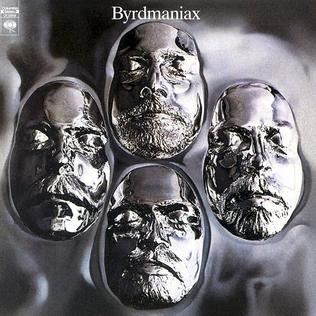
Byrdmaniax is the tenth album by the American rock band the Byrds. It was released in June 1971 on Columbia Records at a time of renewed commercial and critical success for the band, due to the positive reception that their two previous albums, Ballad of Easy Rider and (Untitled), had received. The album was the second by the Byrds to feature the Roger McGuinn, Clarence White, Gene Parsons, and Skip Battin line-up of the band and was mostly recorded in early 1971, while the band were in the midst of an exhausting tour schedule. As a result, the band had little time to hone their new songs before recording commenced and thus, much of the material on the album is underdeveloped. Byrdmaniax was poorly received upon release, particularly in the United States, and did much to undermine the Byrds' new-found popularity.
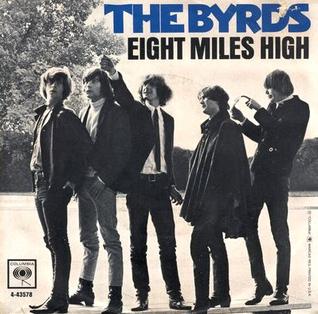
"Eight Miles High" is a song by the American rock band the Byrds, written by Gene Clark, Jim McGuinn, and David Crosby. It was first released as a single on March 14, 1966. Musically influenced by sitar player Ravi Shankar and jazz saxophonist John Coltrane, the song was influential in developing the musical styles of psychedelia and raga rock. Accordingly, critics often cite "Eight Miles High" as being the first bona fide psychedelic rock song, as well as a classic of the counterculture era.
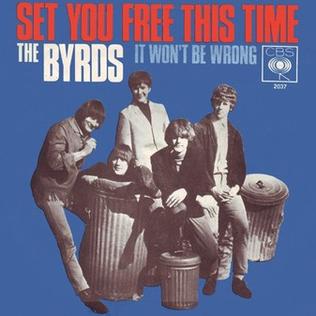
"Set You Free This Time" is a song by the American folk rock group the Byrds, written by band member Gene Clark. It was first released in December 1965 on the group's Turn! Turn! Turn! album, and later issued as a single in January 1966.

Preflyte is a compilation album by the American folk rock band the Byrds and was released in July 1969 on Together Records. The album is a collection of demos recorded by the Byrds at World Pacific Studios in Los Angeles during late 1964, before the band had signed to Columbia Records and become famous. It includes early demo versions of the songs "Here Without You", "You Won't Have to Cry", "I Knew I'd Want You", and "Mr. Tambourine Man", all of which appeared in re-recorded form on the band's 1965 debut album.

The Byrds' Greatest Hits Volume II is the second greatest hits album by the American rock band the Byrds. It was released in the United Kingdom and Europe on October 29, 1971, by CBS Records as a follow-up to the band's first compilation album, The Byrds' Greatest Hits. The album appeared following the band's successful appearance at the Lincoln Folk Festival in England on July 24, 1971, and according to band biographer Johnny Rogan may have been issued by CBS as a reaction to the band's previous studio album, Byrdmaniax, having failed to chart in the UK.

Never Before is a compilation album by the American rock band the Byrds, consisting of previously unreleased outtakes, alternate versions, and rarities. It was initially released by Re-Flyte Records in December 1987 and was subsequently reissued on CD in 1989, with an additional seven bonus tracks.

In the Beginning is a compilation album by the American folk rock band the Byrds and was released in August 1988 by Rhino Records. It features demo recordings made during 1964, before the band became famous.

McGuinn, Clark & Hillman were an American rock group consisting of Roger McGuinn, Gene Clark, and Chris Hillman, who were all former members of the band the Byrds. The group formed in 1977 and was partly modeled after Crosby, Stills, Nash & Young and, to a lesser extent, the Eagles. They were reasonably successful commercially in the United States, with their debut album reaching number 39 on the Billboard Top LPs & Tapes chart and the single "Don't You Write Her Off" reaching number 33 on the Billboard Hot 100.

"She Don't Care About Time" is a song by American folk rock band the Byrds. It was released on a non-album single in October 1965, as the B-side to "Turn! Turn! Turn!". The song was written by Gene Clark, the Byrds' main songwriter between 1964 and early 1966. "She Don't Care About Time" was recorded during sessions for the group's second album Turn! Turn! Turn!. The song is on most of the band's hits compilations.
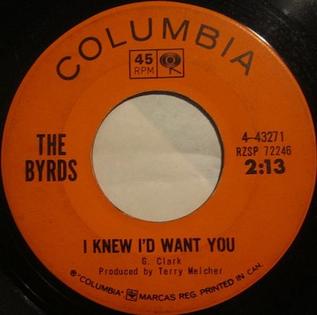
"I Knew I'd Want You" is a song by the folk rock band the Byrds, written by band member Gene Clark, and first released as the B-side to their 1965 debut single, "Mr. Tambourine Man". It was also later included on their debut album, Mr. Tambourine Man.
"Here Without You" is a song written by Gene Clark that was first performed on the Byrds' 1965 debut album Mr. Tambourine Man. It was later covered by other artists, including Reigning Sound and Richard Thompson.
"The World Turns All Around Her" is a song written by Gene Clark that was first recorded by the Byrds for their second album Turn! Turn! Turn! (1965).
References
- 1 2 3 4 Greenwald, Matthew. "If You're Gone". Allmusic . Retrieved 2017-02-12.
- 1 2 3 4 Rogan, Johnny (1997). The Byrds: Timeless Flight Revisited. Rogan House. pp. 146, 301. ISBN 095295401X.
- ↑ Grier, James (2010). "Ego and Alter Ego". In Spicer, Mark S.; Covach, John R. (eds.). Sounding Out Pop: Analytical Essays in Popular Music. University of Michigan Press. pp. 50–51, 60. ISBN 9780472034000.
- 1 2 Einarson, John (2005). Mr. Tambourine Man: The Life and Legacy of the Byrds' Gene Clark. Hal Leonard. pp. 80–81. ISBN 9780879307936.
- 1 2 3 Hjort, Christopher (2008). So You Want to Be a Rock 'n' Roll Star. Jawbone. p. 69. ISBN 9781906002152.
- ↑ Gracyk, Theodore (2001). Wanna be Me: Rock Music and the Politics of Identity . Temple University Press. p. 251. ISBN 9781566399036.
- ↑ Unterberger, Richie. "Turn! Turn! Turn!". Allmusic . Retrieved 2017-02-12.
- ↑ Sheffield, Rob (2004). Brackett, Nathan; Hoard, Christian (eds.). The New Rolling Stone Album Guide (4th ed.). Fireside. p. 126. ISBN 0743201698.
- ↑ Paterson, Beverly (November 12, 2015). "The Byrds' Turn! Turn! Turn! offered a message of hope in troubled times". Something Else!. Retrieved 2017-02-12.
- ↑ Bowker, R.R (1972). The Library Journal Book Review. University of Michigan Press. ISBN 9780835206204.